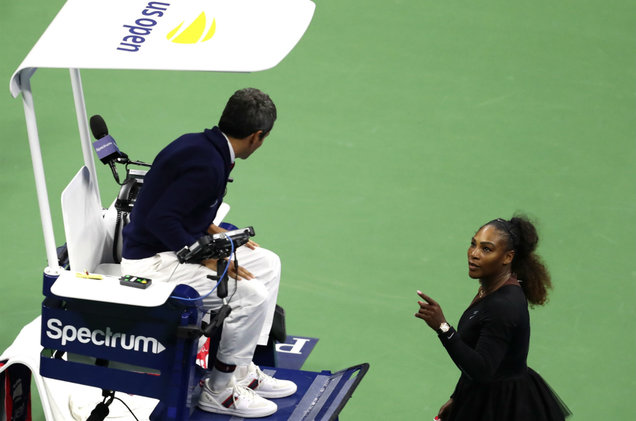Serena Williams Creates Sexism Contreversy After U.S. Open
Over the weekend of Sept. 8-9, Serena Williams placed herself in some hot water with an umpire at the U.S. Open after she received three violations, costing her the game. The first violation, “coaching”, was given after she supposedly received hand signals from her coach in the stands. After a warning for her first infraction, Williams slammed her racket down, which resulted in a point being taken. Finally, she lost the whole game after calling the umpire, Carlos Ramos, a “thief”.
Williams proceeded to call this incident sexist, her reasoning being, “He’s never taken a game from a man just because they said “thief’”. She continued by saying that she is standing up for women’s rights, and that what Ramos ruled would never have been given to man. Was he doing his job, or is her assumption correct?
The debate could be looked at from both angles, the first being the defense of Carlos Ramos. Known for being a strict umpire, Ramos was completely within his rights to give those three penalties to Williams. All three infractions are illegal in the game, and the consequences follow the correct line of punishment. U.S Open officials obviously agree because they made the decision to fine Williams $17,000 for her 3 violations. Besides the fact that he made the correct rulings, it has been proven by recent games that Ramos gives the same rulings to men. Whether it be time rulings or conduct rulings for yelling or slamming rackets, Carlos Ramos has given penalties to multiple male players over the past few years in major gatherings similar to the U.S. Open. The fact that he has given these penalties before to men shows that this did not come from a place of sexism. On that same side, many disagree and say that men have gotten away with these offenses many times prior to this event. While that may be true, a lot of those occurrences happened in a different time period when these situations had never been dealt with before and officials truly didn’t know how to respond. In addition, these times when male players “got away with it”, there were likely other officials in charge of those games. For example, at the 1991 U.S. Open, Jimmy Connors hurled verbal abuse at the umpire, David Littlefield, and was not given a single violation. The truth is, Serena knew walking into the match that Ramos is a tough umpire, and she should’ve been prepared to be called out for these offenses, regardless of whether she felt victimized as a female. This side proves that sexism was likely not the case in this context, but that doesn’t mean it doesn’t exist in the tennis world today, through outfits and simply the rules imposed on women.
On the other hand, Williams could be right. Although it is never appropriate to call umpires names, there has been worse. Even former professional tennis player, James Blake confirms this by tweeting, “I will admit I have said worse and not gotten penalized. And I’ve also been given a “soft warning” by the ump where they tell you knock it off or I will have to give you a violation. He should have at least given her that courtesy. Sad to mar a well played final that way.” Blake brings to light another point, that Williams was never given a “soft warning”. When the first violation was called Williams and her coach received no warning and were penalized immediately. In addition, the first called offence was ill-advised. As Williams wasn’t even watching her coach, Patrick Mouratoglou. A coach only wants to improve a player and help them succeed. Mouratoglou’s gestures were just second nature from constantly trying to adjust and strengthen her technique. As for William’s accusation of sexism, it may not be so far fetched as one may think. In the past Williams has struggled with sexism on many occasions. For instance Williams and her sister, Venus, were called the Williams “Brothers” by Shamil Tarpischev, head of Russia’s Tennis Federation. The president of the French Tennis Federation even banned William’s catsuit, while sometimes men even take off their shirts. Over time it may have become a part of Serena, always expecting the worst. No one can blame her for thinking this given past events. In the end Williams takes this adversity as a chance to speak for the future of women in tennis saying, “I just feel like the fact that I have to go through this is just an example for the next person that has emotions and that want to express themselves, and they want to be a strong woman, and they’re going to be able to do that because of today. Maybe it didn’t work out for me, but it’s going to work out for the next person.”




